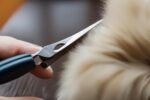Pearly Whites: Maintaining Dental Health in Your Dog
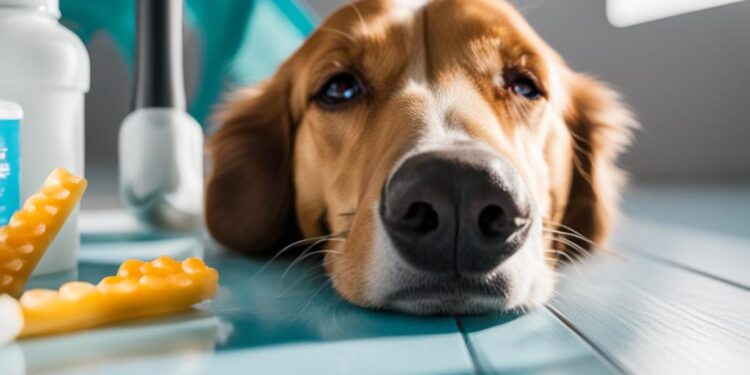
Dogs are not just our pets – they are our companions, and we love them dearly. As pet owners, it is our responsibility to ensure our furry friends receive the best care they deserve, including dental care. Dental hygiene is one of the most overlooked aspects of pet health, but it is essential for maintaining the overall well-being of our canine friends.
In this article, we will explore the importance of Dental Care for Dogs and provide expert tips on Canine dental care, including Doggy tooth brushing and Dental hygiene. We believe that with the right information, equipment, and commitment, anyone can maintain their dog’s pearly whites.
Understanding the Need for Canine Dental Care
Good dental health is critical to overall wellness, and this applies to dogs too. Dental care for dogs is essential to support their long-term well-being. Just like with humans, poor oral hygiene in dogs can lead to serious health problems. Dogs with unhealthy teeth and gums can be affected by:
- Bad breath
- Gum inflammation
- Loss of teeth
- Infections
- Pain when chewing and eating
- Organ damage due to bacteria in the bloodstream
By providing proper dental care to your dog, you can help reduce the risk of dental issues and support their overall health.
Regular dental check-ups and cleanings, brushing their teeth, and giving them dental chews and oral rinses can help maintain your dog’s dental hygiene. Neglecting their oral health can have consequences that not only affect their teeth and gums but can also lead to severe health issues that can be easily prevented. Start incorporating dental care into your dog’s regular routine and prioritize their oral health.
The Basics of Doggy Tooth Brushing
Doggy tooth brushing might seem like a daunting task, but it is an essential part of maintaining your dog’s dental health. Regular brushing can help prevent the buildup of plaque and tartar, reducing the risk of oral health issues such as gum disease.
Here are some step-by-step instructions to help you introduce tooth brushing to your furry friend:
- Choose the right time: Pick a time when your dog is calm and relaxed, such as after a walk or playtime.
- Get your supplies: Use a soft-bristled toothbrush and toothpaste specifically designed for dogs. Never use human toothpaste, as it can be harmful to dogs.
- Introduce the toothbrush: Let your dog sniff and taste the toothbrush and toothpaste before starting. This will help them get used to the new taste and texture.
- Start brushing: Gently lift your dog’s lip and brush their teeth in a circular motion. Focus on the gum line, as this is where plaque and tartar tend to accumulate.
- Treat your dog: Reward your dog with a treat or verbal praise after every successful brushing session.
Remember, it may take some time for your dog to get used to tooth brushing. Be patient and consistent with your efforts, and always end on a positive note. With time, your dog will become more comfortable with the process.
Expert tip: If your dog is resistant to tooth brushing, try using a finger brush or gauze wrapped around your finger as an alternative. This can help your dog become more comfortable with the sensation of brushing before moving on to a toothbrush.
Essential Dental Hygiene Products for Dogs
Keeping your dog’s teeth and gums healthy is key to ensuring their overall well-being. Regular dental care practices are necessary, but you can also enhance your dog’s dental health by incorporating dental hygiene products into their routine.
Here are some essential dental hygiene products that can help maintain your dog’s oral health:
| Product | Benefits |
|---|---|
| Dental Chews | Helps remove plaque and tartar buildup while freshening breath |
| Dental Rinses | Kills bacteria in the mouth and freshens breath, especially helpful for dogs with gum disease |
| Toothbrushes and Toothpaste | Allows for regular tooth brushing to prevent plaque buildup and maintain oral hygiene |
| Water Additives | Helps decrease bacteria in the mouth when added to drinking water |
When selecting dental hygiene products for your dog, choose those that are specifically designed for canine dental care. Avoid using human toothpaste, as it can be harmful to dogs.
Incorporating these dental care products into your dog’s oral care routine, along with regular tooth brushing and veterinary check-ups, can help enhance their dental health and overall well-being.
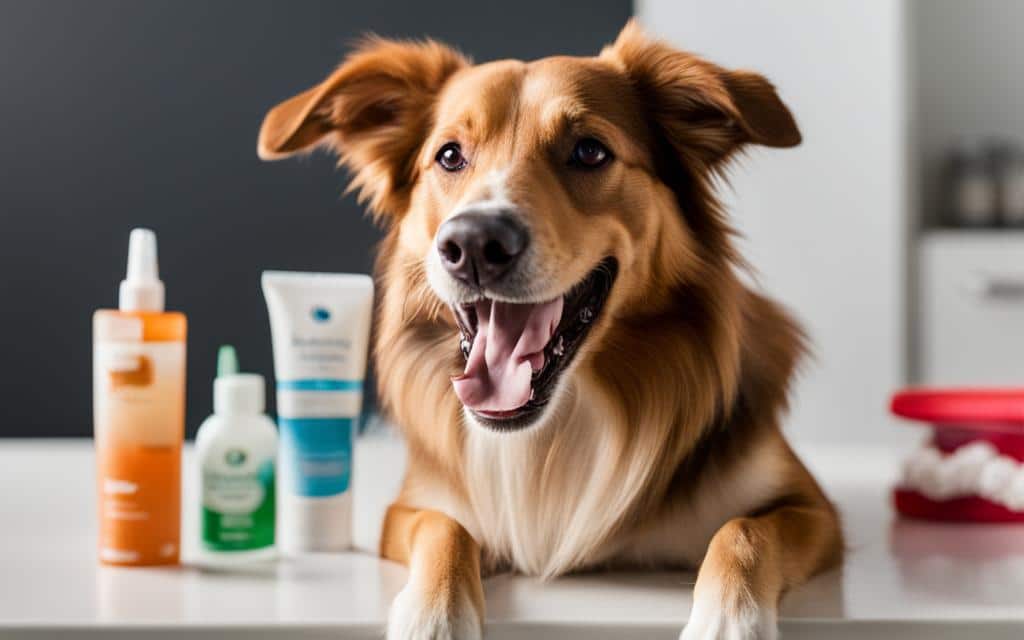
Signs of Dental Problems in Dogs
While a regular dental hygiene routine is crucial for your furry friend’s oral health, it’s equally important to keep an eye out for any signs of dental problems. Dental issues can cause discomfort, pain, and potentially lead to more severe health problems.
Some common signs of dental problems in dogs include:
- Bad breath
- Difficulty chewing or eating
- Bleeding, inflamed, or receding gums
- Loose or missing teeth
- Excessive drooling or pawing at the mouth
- Changes in appetite or behavior
If you notice any of these symptoms, it’s crucial to seek professional veterinary care for your dog. Delaying treatment can result in pain and suffering for your furry friend and lead to more expensive procedures down the road.
It’s worth noting that some dogs may not display any visible signs of dental problems despite having underlying issues. Regular dental check-ups with your vet can help catch and address any dental problems early on.
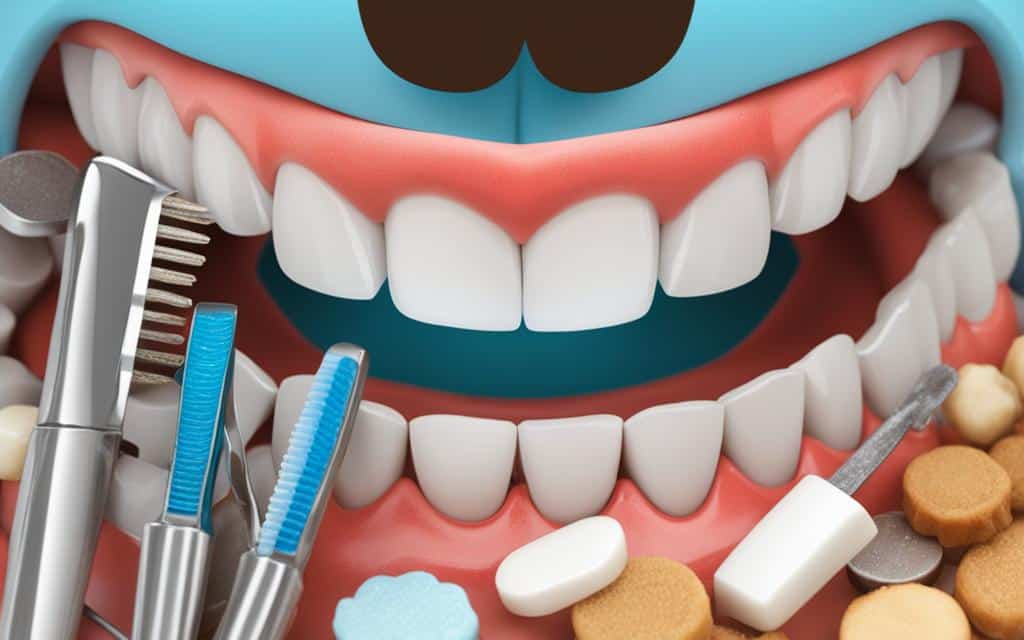
“By addressing any dental problems promptly, you can avoid your dog’s suffering while also saving on veterinary costs.” – Darian Nichols, Veterinarian
Preventive Measures for Optimal Dental Health
Prevention is always better than cure, and this is no different when it comes to dental care for dogs. By implementing simple strategies, you can reduce the risk of dental issues in your furry friend.
Dietary Considerations
Feeding your dog a balanced diet that is appropriate for their age, breed, and activity level is crucial for maintaining good dental health. Avoid feeding dogs sugary or starchy treats and opt for dental chews that can help reduce tartar buildup.
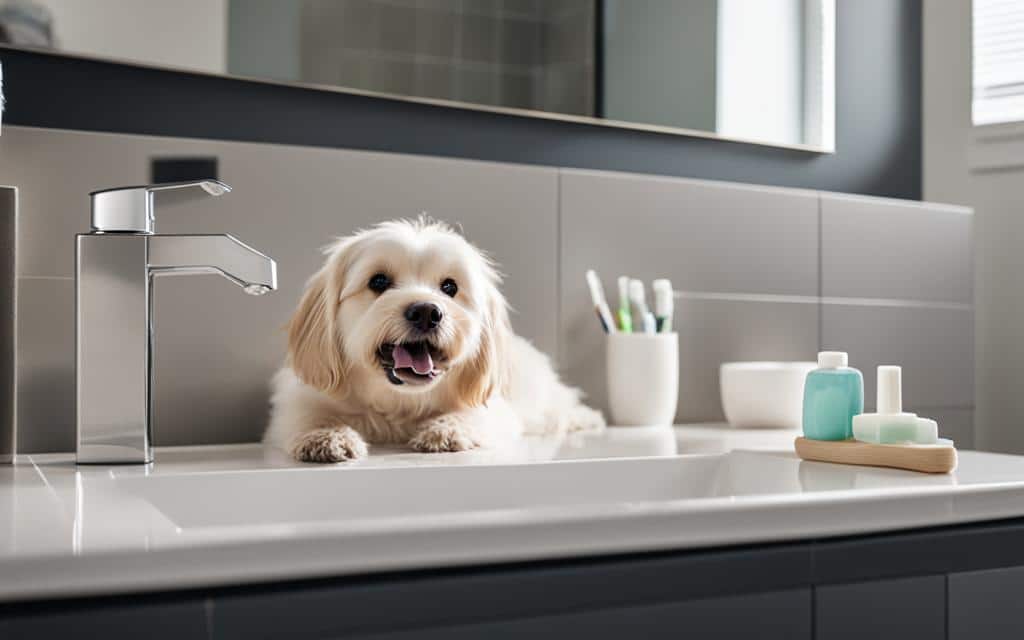
Chew Toys
Chew toys that are designed to help clean teeth and massage gums can be an effective tool in preventing plaque buildup. Choose chew toys that are appropriate for your dog’s size and chewing style, as well as those that are made from safe materials.
Tip: Rotate your dog’s toys every few days to keep them interested and engaged.
Regular Teeth Cleaning
While daily tooth brushing is ideal for maintaining your dog’s dental health, you can also use dental wipes or rinses to supplement their oral care routine. Be sure to only use products that are specifically formulated for dogs and avoid using human toothpaste as it may contain ingredients that are harmful to your dog.
| Preventive Measures | Benefits |
|---|---|
| Dietary considerations | Helps reduce tartar buildup |
| Chew toys | Effective in removing plaque and promoting good dental health |
| Regular teeth cleaning | Supplements daily tooth brushing routine |
By incorporating these simple preventive measures into your dog’s dental care routine, you can help keep their teeth and gums healthy and strong. Regular dental check-ups with a veterinarian are also essential to identify any potential issues and ensure that your dog’s dental health is in top shape.
Regular Dental Check-Ups for Your Dog
Regular dental check-ups for dogs are just as essential as regular visits to the dentist for humans. Canine dental care is crucial for maintaining your dog’s overall health and well-being. Professional dental cleanings may be necessary to ensure your dog’s teeth and gums are healthy. These check-ups help ensure early detection and prompt treatment of dental issues, which may prevent more severe health problems from developing.
It is recommended that you schedule dental check-ups for your dog at least once a year. However, the frequency may vary based on your dog’s breed, age, and dental health history. It’s essential to consult with your veterinarian on the frequency of check-ups suitable for your dog.
The Importance of Professional Dental Cleanings for Dogs
At-home dental care for dogs, including regular brushing and the use of dental chews, is an excellent way to maintain good oral hygiene. However, professional dental cleanings performed by your veterinarian are essential for keeping your dog’s teeth and gums healthy.
During a dental cleaning, your veterinarian can remove plaque and tartar buildup from your dog’s teeth and detect any underlying dental issues that may require treatment. They may also polish your dog’s teeth to help prevent future plaque buildup.
Guidelines for Scheduling Veterinary Visits
When scheduling your dog’s dental check-up, it’s essential to consider the following guidelines:
- Consult with your veterinarian on the frequency of dental check-ups suitable for your dog
- Book appointments well in advance
- Avoid feeding your dog before the appointment, to make anesthesia administration safer for your dog
- Prepare for transportation to and from the appointment, consider your dog’s comfort and safety during the trip
By following these guidelines, you can ensure that your dog receives the best possible dental care.
Dealing with Fear and Resistance to Dental Care
While dental care is important for dogs, some may be resistant or fearful of the process. Here are some tips and techniques to help ease their anxiety and make the oral care process more comfortable for both you and your dog.
Start Slow
If your dog is new to dental care, start slow. Introduce them to the toothbrush and toothpaste before attempting a full brushing. Let them explore the tools and become comfortable with them. Gradually increase the brushing time until they are used to the routine.
Positive Reinforcement
Use positive reinforcement to encourage your dog to cooperate during dental care. Offer treats or verbal praise during and after the brushing. This will help create a positive association with dental care and make it a more enjoyable experience for your dog.
Choose the Right Toothbrush
Choosing the right toothbrush can make a big difference. Look for a toothbrush designed specifically for dogs. These have softer bristles and are easier to maneuver in your dog’s mouth. You may also want to consider using a finger brush or dental wipes if your dog is resistant to traditional toothbrushes.
Be Patient
Finally, be patient. Dental care may take some time for your dog to get comfortable with, so don’t give up if they are resistant at first. With time and patience, your dog can learn to love the dental care process.
Conclusion
Keeping your dog’s teeth healthy is crucial for their overall health and happiness. By regularly brushing your dog’s teeth and providing dental hygiene products, you can prevent oral health problems such as plaque and tartar buildup, gum disease, and tooth decay.
It’s important to recognize the signs of dental problems in dogs, such as bad breath, swollen gums, and difficulty eating. If you notice any of these symptoms, it’s essential to seek professional veterinary care.
At the same time, preventive measures such as a healthy diet and regular dental check-ups can help keep your dog’s teeth in top shape and prevent dental problems from occurring. So, make sure to schedule regular veterinary check-ups and stick to a dental hygiene routine that works for you and your dog.
Remember, dental care for dogs is just as vital as it is for humans. By giving your dog the care and attention they deserve, you can ensure that their pearly whites stay healthy and strong for years to come.
FAQ
Why is dental care important for dogs?
Dental care is crucial for dogs because it helps prevent oral health issues such as plaque buildup, gum disease, and tooth decay. Regular dental care can also contribute to overall health and well-being by reducing the risk of systemic infections and other health problems.
How often should I brush my dog’s teeth?
Ideally, you should brush your dog’s teeth daily to maintain optimal dental health. However, if that’s not feasible, aim for at least three times a week. Consistency is key to ensuring the effectiveness of tooth brushing in preventing dental issues.
Can I use regular toothpaste to brush my dog’s teeth?
No, you should never use human toothpaste to brush your dog’s teeth. Human toothpaste contains ingredients, such as fluoride, that can be toxic to dogs if ingested. Always use toothpaste specially formulated for dogs, which is safe to swallow.
How do I introduce tooth brushing to my dog?
Introduce tooth brushing gradually and make it a positive experience for your dog. Start by getting them used to the sensation of having their gums and teeth touched, and eventually work your way up to using a toothbrush and toothpaste. Reward your dog with treats and praise to reinforce positive behavior.
What are some signs of dental problems in dogs?
Some signs of dental problems in dogs include bad breath, swollen or bleeding gums, difficulty chewing, loose or missing teeth, and excessive drooling. If you notice any of these signs, it’s important to consult your veterinarian for a thorough dental examination.
How can I prevent plaque and tartar buildup in my dog’s teeth?
There are several preventive measures you can take to minimize plaque and tartar buildup in your dog’s teeth. These include providing dental chews, using dental rinses or sprays, incorporating specially formulated dental diets, and regularly brushing your dog’s teeth.
Do dogs need professional dental cleanings?
Yes, professional dental cleanings performed by a veterinarian may be necessary to remove tartar and plaque buildup that cannot be addressed through regular tooth brushing alone. Your veterinarian can assess your dog’s dental health and determine if a professional cleaning is needed.
My dog is afraid of dental care. What should I do?
If your dog is fearful or resistant to dental care, it’s important to take a gradual and gentle approach. Start by acclimating your dog to the dental care tools and techniques, and use positive reinforcement to make the experience more enjoyable. You may also consider seeking the assistance of a professional dog trainer or veterinary behaviorist.
